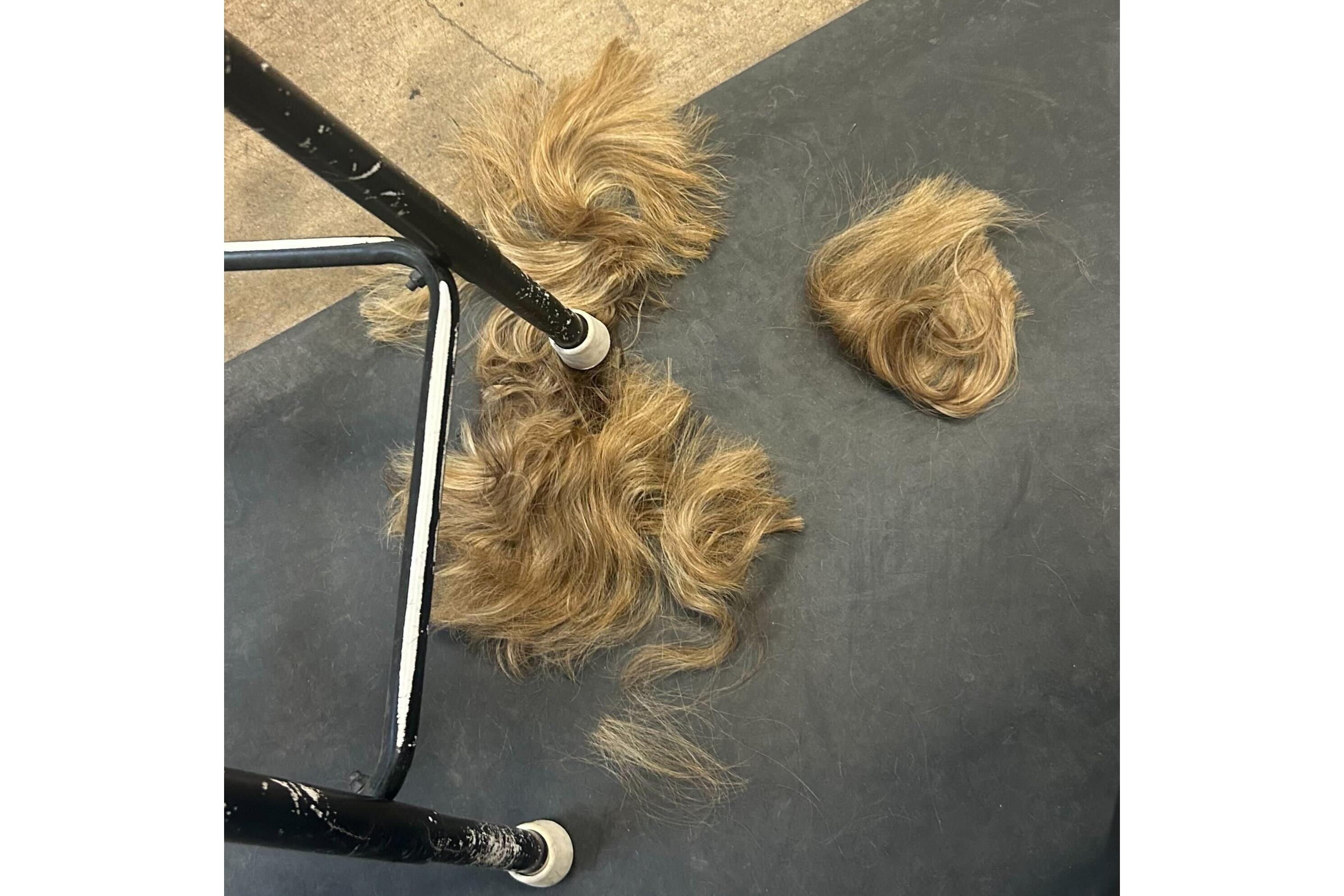Opinion: Amid societal scrutiny of women, short hair builds strong sense of self
Columnist Micah Hoffman’s hair sits on the ground after a haircut. Hoffman emphasizes that despite societal expectations, maintaining a strong sense of self-expression is critical.(Courtesy of Micah Hoffman)
By Micah Hoffman
May 18, 2025 9:03 p.m.
This post was updated May 18 at 10:32 p.m.
I didn’t realize how socially valuable long hair was until I had none to hide behind.
Now, years after that initial cut, I can feel my long hair running past my shoulders, protecting me from the social scrutiny women are often unwittingly subjected to.
I felt invisible when I cut my hair into a boyish ’60s pixie cut two years ago. People were cold. Strangers stopped smiling, as if I had broken an unspoken contract by choosing personal authenticity over beauty standards.
Everyone had something to say, and most of it was negative.
It is mentally exhausting to sift through the landfill of beauty trends, both online and offline. At that point, I had given up on them – though I wasn’t prepared to be rendered socially substandard.
My experience made it clear that hair isn’t just about personal style – it’s a proxy for conformity, desirability and the assumptions people make about your identity. When I spoke to other students who had cut their hair short, it exposed just how deeply appearance shapes the way women with short hair and gender-nonconforming individuals are treated.
Rachael Gibson, also known as The Hair Historian on Instagram, said short hair has long reflected political change. Periods of social progress – namely the 1920s and 1960s – both saw sharp bobs and pixie cuts serve as expressions of rebellion.
“Cutting the hair is such a symbolic gesture of all of these ideas of what people believe a woman to be,” Gibson said. “When we see short hair trend at various points in culture, like more recent history, it tends to be moments when quite a lot is happening with women’s politics.”
Gibson said she has heard many present-day stories about women losing their jobs and partners after cutting their hair, which she attributes to deeper anticonformity connotations.
She added that hair can be a visual metaphor for individual expression.
“All these kinds of wild things happen not just because people don’t like the hair but because of what the hair represents – it’s freedom,” Gibson said. “It’s women taking strides and doing things that is not just what they’ve been told.”
Beyond symbolizing rebellion, pixie cuts also carry connotations about gender and sexuality.
Some with short hair are often stereotyped as being lesbians, though hair length doesn’t determine someone’s sexual orientation. I was once walking in Hollywood with my mom when an old woman shouted “Lesbians” at us from her car.
Aran Denis, a second-year theater student, said people also assumed they were lesbian when they had short hair.
“There’s this point in every friendship that I make where I’m like, ‘I’m not a lesbian. I like men and men only,’ and people are like, ‘What?’” they said. “That is also tied to how androgynous I present – or try to present.”
Ania Sokolowska, a third-year physics student, said people assumed she was nonbinary after she cut her hair into a pixie cut.
“I’ve never been misgendered until now,” she said. “Some people just weren’t sure, so they used they/them pronouns for me, and then I said I use she/her.”
There is also the dating predicament. The male gaze doesn’t just define how women and gender-nonconforming people with short hair are seen – it often determines whether they’re seen at all.
Denis said men often disregarded them when they had short hair – and that has since changed after they grew out their hair.
“Men just treat me better – they don’t immediately dismiss me when we interact,” Denis said. “It’s more visually conforming to that feminine ideal.”
This principle caused an influx of male attention for Denis, they said. After many years of keeping their curly ginger hair short, they realized how differently they were treated when they had short hair.
“As soon as I started growing my hair out – not changing anything else about myself but growing my hair out – people were attracted to me and pursued me and wanted to have more than platonic relationships with me,” Denis said.
Denis’ experience speaks to how political short hair is – and that it can be a misleading and discriminatory shorthand for identity.
These assumptions aren’t harmful because they’re associated with being lesbian or nonbinary – they’re harmful because they turn expression into a stereotype.
When people equate short hair with being queer or gender-nonconforming, they reduce individuals to surface traits. This reinforces superficial ideas of what different identities “look like” and leaves little room for self-definition.
The pain comes from feeling invisible in your true identity – as if your appearance has overshadowed each facet of who you are.
Sokolowska said hair shouldn’t define gender, and having short hair reveals just how much gender is lived versus how it’s expected by others.
Even with all the pain and scrutiny I experienced, I would cut my hair again – and I encourage others to do the same. My identity is now turned inward, not outward.
“I’m me, no matter what my hair looks like,” Denis said. “It astounds me when people do make judgments about me based off of my hair because I’m like, ‘Why?’”
I thought I lost myself when I cut my hair.
But in the silence that followed – without the compliments, flirtation and easy approval – I built a stronger sense of self.
That will stick with me, long hair or not.
